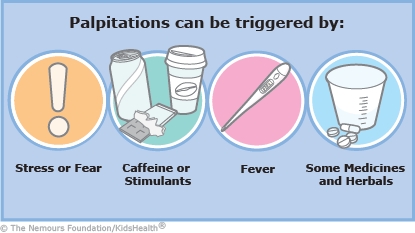- Home
- Humana Medicaid
- Kentucky Medicaid
- Medicaid extras
- Health and wellness
- Parents Home
- Para Padres
- A to Z Dictionary
- Allergy Center
- Asthma
- Cancer
- Diabetes
- Diseases & Conditions
- Doctors & Hospitals
- Emotions & Behavior
- First Aid & Safety
- Flu (Influenza)
- Food Allergies
- General Health
- Growth & Development
- Heart Health & Conditions
- Homework Help Center
- Infections
- Newborn Care
- Nutrition & Fitness
- Play & Learn
- Pregnancy Center
- Preventing Premature Birth
- Q&A
- School & Family Life
- Sports Medicine
- Teens Home
- Para Adolescentes
- Asthma
- Be Your Best Self
- Body & Skin Care
- Cancer
- Diabetes
- Diseases & Conditions
- Drugs & Alcohol
- Flu (Influenza)
- Homework Help
- Infections
- Managing Your Weight
- Medical Care 101
- Mental Health
- Nutrition & Fitness
- Q&A
- Safety & First Aid
- School, Jobs, & Friends
- Sexual Health
- Sports Medicine
- Stress & Coping
Heart Palpitations
What Are Heart Palpitations?
Heart palpitations (pal-pih-TAY-shuns) are irregular heartbeats. During a palpitation, the heart might feel like it’s racing, fluttering, skipping a beat, or beating irregularly.
Palpitations usually aren't a sign of a health problem, and most kids who have them won't need to limit their physical activity.
What Causes Heart Palpitations?
Many things can make the heart beat quickly, including exercise, stress, fever, caffeine, nicotine, illegal drugs, thyroid disorders, and some medicines.
Rarely, they happen because of an abnormal heart rhythm (arrhythmia) and may be a sign of a serious medical condition. Arrhythmias can be caused by heart disease, genetics, chemical imbalances in the blood, infections, medicines, and injuries to the heart.
Kids who get palpitations often or have them along with fainting, chest pain, sweating, or shortness of breath should see a doctor, as these can be signs of an arrhythmia.
How Are Heart Palpitations Diagnosed?
To diagnose palpitations, doctors ask about what a child was doing when they happened and listen to the heart. They also might order an EKG (electrocardiogram). This quick, painless test measures the heart's electrical waves to see how it's working. Sometimes a child will wear a portable heart monitor that checks the heartbeat for 24 hours.
How Are Heart Palpitations Treated?
Most palpitations don’t need any treatment. If a child has an arrhythmia, doctors will treat it, which will stop the palpitations.
What Else Should I Know?
For kids who get heart palpitations, these tips can help:
- Help your child cut back on caffeine, which is found in coffee, some sodas, energy drinks, chocolate, cold medicine, and some pain relievers. Stress and herbal supplements also can cause palpitations.
- Kids should drink enough liquids every day. How much liquid they need differs by age. Ask your doctor how much your child should drink.
- Tobacco products and secondhand smoke cause palpitations in some people. If your child or anyone in your household smokes, call 1-800-QUIT-NOW for advice on quitting.
- Your child should go for all regular checkups. If needed, the doctor may recommend that your child see a cardiologist (heart specialist).


© 1995- The Nemours Foundation. KidsHealth® is a registered trademark of The Nemours Foundation. All rights reserved.
Images sourced by The Nemours Foundation and Getty Images.